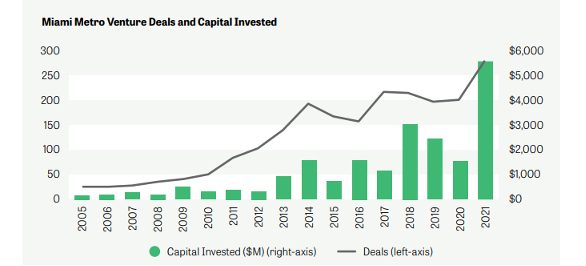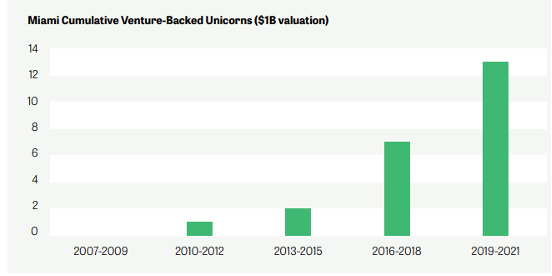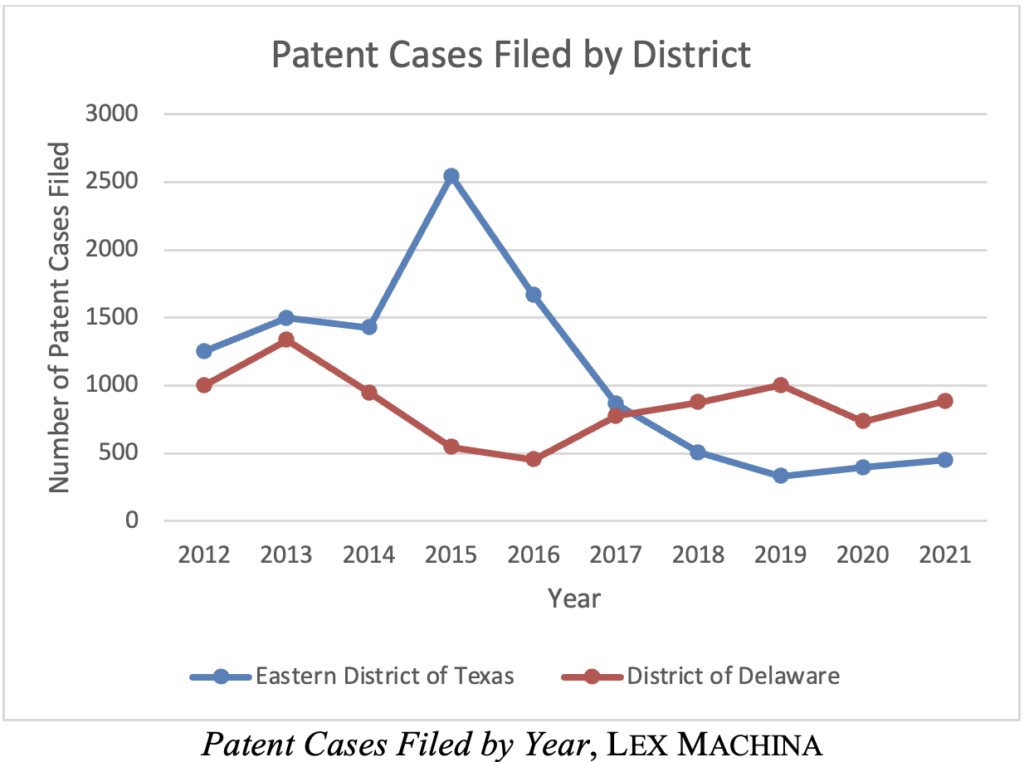“The Miami tech boom is showing no signs of slowing and likely will bring with it a wave of patent litigation to the district.”
 “How can I help?” Not even the mayor of Miami could have predicted the effect those four simple words would have on the city traditionally known for its palm trees and nightlife. But that tweet, sent by Mayor Francis Suarez in December 2020, caused a tech hurricane to touch down in the South Florida area. The tweet, shown below, was in response to a San Francisco venture capitalist who (likely somewhat facetiously) suggested that Silicon Valley be moved to Miami.
“How can I help?” Not even the mayor of Miami could have predicted the effect those four simple words would have on the city traditionally known for its palm trees and nightlife. But that tweet, sent by Mayor Francis Suarez in December 2020, caused a tech hurricane to touch down in the South Florida area. The tweet, shown below, was in response to a San Francisco venture capitalist who (likely somewhat facetiously) suggested that Silicon Valley be moved to Miami.

Francis Suarez (@FrancisSuarez), TWITTER (Dec. 4, 2020, 8:43 PM)
Since then, Miami has been dubbed the latest up-and-coming tech hub. And if you follow the money, you’ll see that the numbers really do show that the South Florida area is experiencing a drastic shift. In 2020, Miami startups and later-stage companies raised $2.27 billion in funding. In 2021, that number was $5.33 billion.

In January 2021, Softbank vowed to invest $100 million in Miami-based startups. Within nine months, they invested $250 million. In 2007, there were zero “unicorns” (or tech companies with at least a billion-dollar valuation) located in Miami. In 2021, 13 unicorns called Miami home.
Of course, where tech (and funding) goes, financial services follow, and Miami is no different. Blackstone is in the process of opening a Miami office for 200 tech-focused employees. BlackRock announced plans to open a West Palm Beach office for dozens of employees. And the biggest splash of all, Citadel announced it intends to relocate its entire headquarters from Chicago to Miami.
So, what caused this tech boom? A tweet from the mayor certainly wasn’t the only factor. COVID-19 probably played a large part. With the popularization of working from home, tech employees were scattered around the country. While the rest of the country (including Silicon Valley) introduced strict social restrictions, Florida did not. Those looking to socialize in restaurants and bars flocked to Miami. It’s no secret that tech employees place a high value on socialization and networking opportunities. In fact, during the pandemic, Miami had the highest year-over-year tech worker migration of any U.S. city. Miami’s year-round perfect weather, beautiful beaches, and abundance of restaurants and bars provide the perfect foundation for a new tech social hub.
A favorable tax regime likely also played a role. When you compare the ever-rising income taxes in California and New York to Florida’s lack thereof, a worker’s (let alone an entire company’s) decision to move to Miami isn’t that difficult to understand.
A Jurisdictional Shift
This tech boom will undoubtedly influence litigation practice in the South Florida area. Specifically, we’ll likely see a rise in the number of patent infringement lawsuits brought in the Southern District of Florida. Tech companies in the area should accordingly prepare themselves for such a jurisdictional shift.
The TC Heartland decision caused a major change in the jurisdictional analysis necessary in deciding where a patent infringement suit can be brought. A plaintiff can sue a defendant for patent infringement anywhere that defendant “resides.” In the past, “reside” meant anywhere the allegedly infringing product was sold, which, for national entities, was pretty much every jurisdiction. This led to a huge patent litigation increase in traditionally plaintiff-friendly venues (such as the Eastern District of Texas). However, after TC Heartland, “reside” now means the place of incorporation. Accordingly, the jurisdictions in which these tech companies are incorporated or have an established place of business (such as the District of Delaware) saw huge jumps in the number of patent cases heard.

The Southern District of Florida has already seen a recent small jump in its number of patent cases, with 59 cases filed in 2020 and 73 filed in 2021. It will likely soon see a larger jump, similar to that in the District of Delaware, since more tech companies are relocating to the Miami area.
To prepare themselves, Miami tech companies should become aware of some basic procedural information about the Southern District of Florida. Most importantly, the district is known to have what is commonly referred to as a “rocket docket,” averaging about 19 months per civil trial, making it the third-fastest district court in the country. Such a quick trial timeline may be disadvantageous for companies attempting to defend against complex patents, because it will likely lead to hectic and procedurally complicated litigations.
Miami Needs Patent Rules
To combat this unwanted possibility, the Southern District of Florida should consider implementing local patent rules. Such local rules have been adopted in some of the more popular patent infringement jurisdictions to set a more predictable structure in patent cases. In 2000, the Northern District of California became the first district to implement these rules. The rules simplify normally complex procedures, such as claim construction and invalidity and infringement contentions, forcing the parties to organize and distribute their complex theories of the case early on, which gives each party greater clarity as to the arguments and promotes lower cost litigation and out-of-court resolution. The rules have been very well received by courts, litigators, and legal commentators. The Federal Circuit has repeatedly explicitly endorsed these rules.
While many other district courts have adopted similar local patent rules, some popular patent forums (such as the District of Delaware) have not. However, in many of these popular patent forums, the judges have patent-specific form scheduling orders or other set rules governing patent cases. In Delaware, each judge has implemented some set of rules to be used for patent cases tried before them, despite Delaware not having the rocket docket of the Southern District of Florida. The Southern District of Florida, unlike Delaware, does not appear to have any such judge-specific orders for patent cases. Thus, it may be even more crucial for the district to enact local patent rules if it wishes to maintain fast-paced litigation in these complex patent matters.
The Southern District of Florida has previously considered implementing local patent rules and other measures to assist its judges in overseeing patent matters. In 2011, the district issued an administrative order designating a subcommittee to develop local patent rules. Unfortunately, nothing came of this order or the subcommittee. The district also participated in a Patent Pilot Program, which was instituted by Congress in 2011. According to the program, all patent matters in the district were to be transferred to one of three designated judges, in order to help those judges develop expertise in patent issues. As of 2014, the district no longer participates in the program, meaning specific judges are no longer quickly building expertise in patent issues.
Prepare for the Patent Storm
It is encouraging that the Southern District of Florida has taken steps in the past to improve its ability to deal with complex patent matters, but now is the time to dust off those efforts and move them to the next level. The Miami tech boom is showing no signs of slowing and likely will bring with it a wave of patent litigation to the district. To prepare itself, the district should implement local patent rules to ensure that these new Miami tech companies can properly and predictably defend and enforce their technology. The patent storm is approaching, and the district needs to quickly build shelter.
Image Source: Deposit Photos
Image ID:168707964
Copyright:Epitavi

![[IPWatchdog Logo]](https://ipwatchdog.com/wp-content/themes/IPWatchdog%20-%202023/assets/images/temp/logo-small@2x.png)


![[Advertisement]](https://ipwatchdog.com/wp-content/uploads/2024/05/Quartz-IP-May-9-2024-sidebar-700x500-1.jpg)
![[Advertisement]](https://ipwatchdog.com/wp-content/uploads/2024/04/Patent-Litigation-Masters-2024-sidebar-last-chance-700x500-1.jpg)

![[Advertisement]](https://ipwatchdog.com/wp-content/uploads/2021/12/WEBINAR-336-x-280-px.png)
![[Advertisement]](https://ipwatchdog.com/wp-content/uploads/2021/12/2021-Patent-Practice-on-Demand-recorded-Feb-2021-336-x-280.jpg)
![[Advertisement]](https://ipwatchdog.com/wp-content/uploads/2021/12/Ad-4-The-Invent-Patent-System™.png)






Join the Discussion
2 comments so far.
Wes
August 12, 2022 06:59 pmIt’s a welcome development – increasing technology & investments growth. Coming from someone who was born & raised in Miami.
Anon
August 12, 2022 10:55 amI would hope that a Pro-Disruptive-Innovation would be front and center in the State of Florida’s response.
Yes, that does mean an Anti-Efficient-Infringer mindset.
Maybe they (like the Federal Court of Claims) can start modeling a certain Jurist from the State of Texas)…